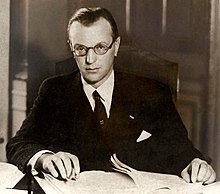Arthur Seyß-Inquart
| Arthur Seyss-Inquart | |
|---|---|

Seyss-Inquart, 1940
|
|
|
12th Chancellor of Austria Federal State of Austria |
|
|
In office 11 March 1938 – 13 March 1938 |
|
| President | Wilhelm Miklas |
| Preceded by | Kurt Schuschnigg |
| Succeeded by |
Anschluss (Adolf Hitler as Führer and Reich Chancellor of Nazi Germany) Karl Renner (1945) |
|
Reich Minister without portfolio Nazi Germany |
|
|
In office 1 May 1939 – 30 April 1945 |
|
| Chancellor | Adolf Hitler (Führer and Reich Chancellor) |
| Reichskommissar for the Occupied Dutch Territories | |
|
In office 29 May 1940 – 7 May 1945 |
|
| Appointed by | Adolf Hitler |
| Preceded by | Alexander von Falkenhausen (military governor) |
| Succeeded by | None |
|
Reich Minister of Foreign Affairs Nazi Germany |
|
|
In office 30 April 1945 – 2 May 1945 |
|
| President | Karl Dönitz |
| Chancellor | Joseph Goebbels |
| Preceded by | Joachim von Ribbentrop |
| Succeeded by | Lutz Graf Schwerin von Krosigk |
| Personal details | |
| Born |
22 July 1892 |
| Died | 16 October 1946 (aged 54) Nuremberg, Germany |
| Political party | Independent (1933-1938) Nazi (1938-1945) |
| Spouse(s) | Gertrud Maschka (m. 1916) |
| Children | 3 |
| Profession | Lawyer |
22 July 1892
Stannern, Moravia,
Austria-Hungary
![]() Arthur Seyss-Inquart (in German: Seyß-Inquart; 22 July 1892 – 16 October 1946) was an Austrian Nazi politician who served as Chancellor of Austria for two days – from 11 to 13 March 1938 – before the Anschluss annexation of Austria by Nazi Germany, signing the constitutional law as acting head of state upon the resignation of President Wilhelm Miklas.
Arthur Seyss-Inquart (in German: Seyß-Inquart; 22 July 1892 – 16 October 1946) was an Austrian Nazi politician who served as Chancellor of Austria for two days – from 11 to 13 March 1938 – before the Anschluss annexation of Austria by Nazi Germany, signing the constitutional law as acting head of state upon the resignation of President Wilhelm Miklas.
During World War II, he served the Third Reich in the General Government of Poland and as Reichskommissar in the Netherlands. At the Nuremberg trials, he was found guilty of crimes against humanity, was sentenced to death, and was subsequently executed for his crimes.
Seyss-Inquart was born in 1892 in Stonařov, at that time Stannern, a German-speaking village in the neighbourhood of the predominantly German-speaking town of Jihlava (Iglau). This area constituted a German linguistic island in the midst of a Czech-speaking environment and this situation may have contributed to the outspoken national consciousness of the family and the young Arthur in particular. Iglau was an important town in Moravia, one of the Czech provinces of the Austro-Hungarian Empire, in which an increasing competition between Germans and Czechs was going on. His parents were the school principal Emíl Seyss-Inquart and Augusta Hirenbach.
...
Wikipedia
